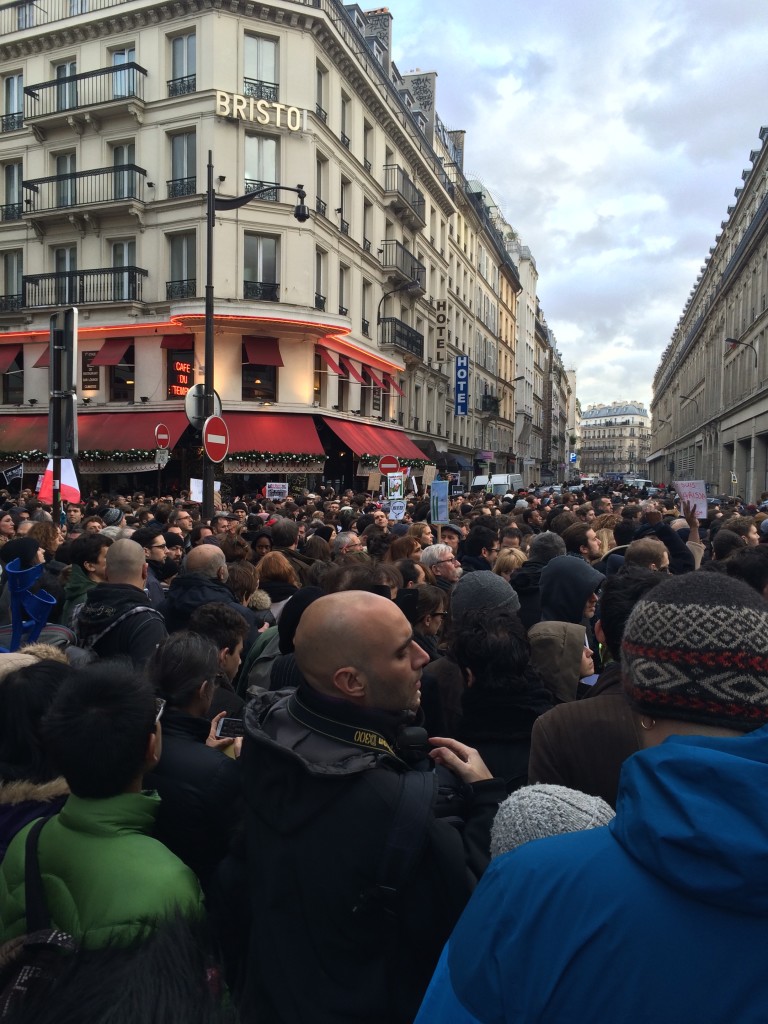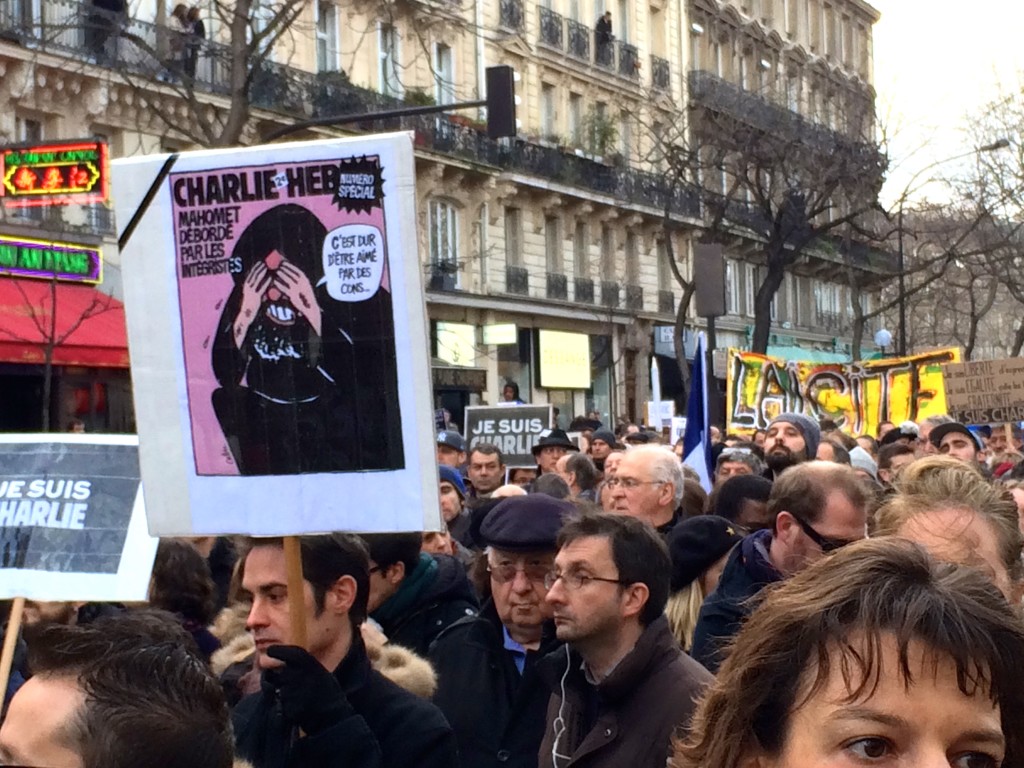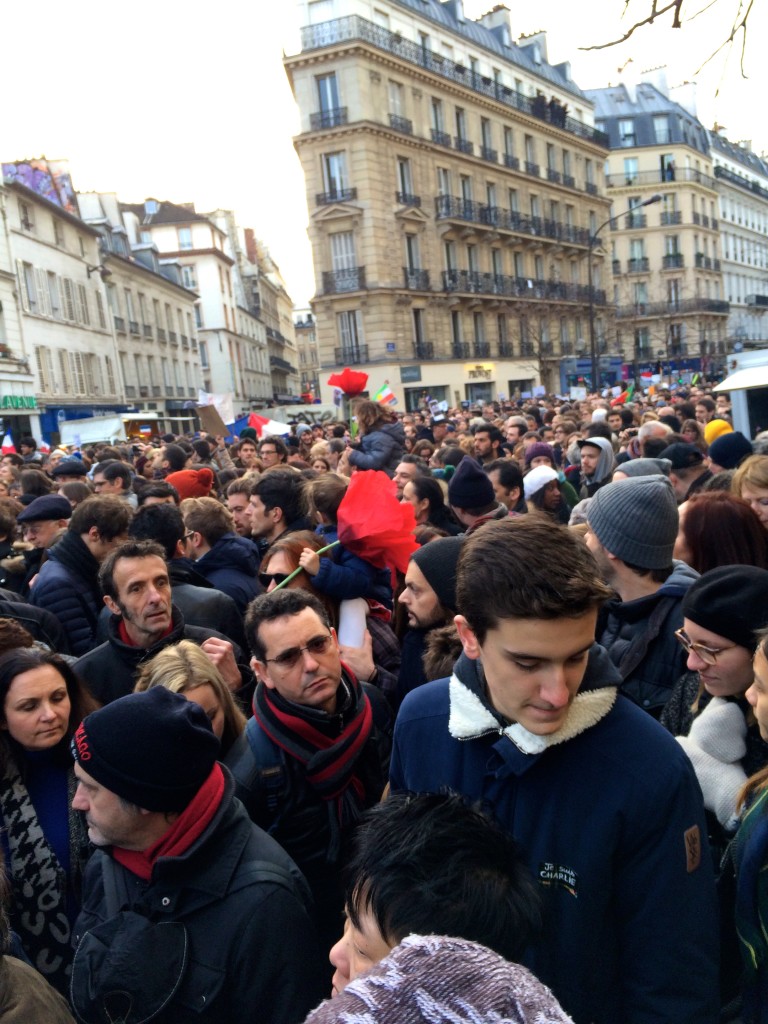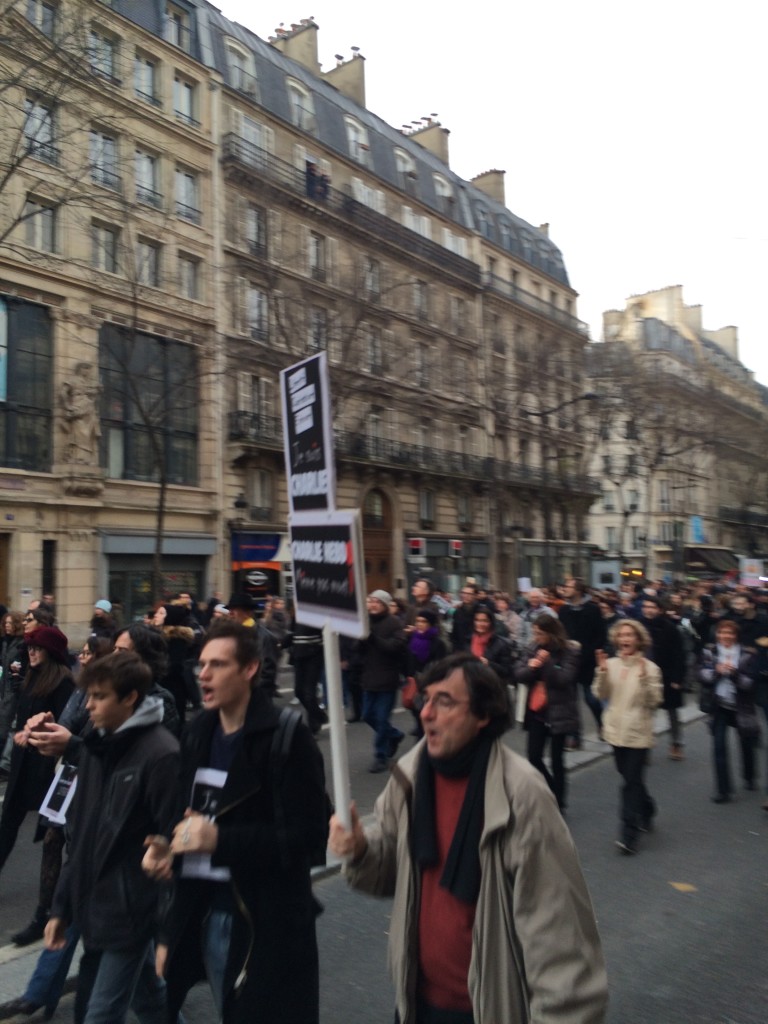 It’s a day after the massive solidarity rally after the Charlie Hebdo killings. Apparently over a million people gathered, with attention given particularly to the world leaders that showed up. The metro was free, to encourage people to come, and the Parisian friend I went with explained that marches in Paris have a symbolic meaning: this one, from Republique to Nation, reflected a vow to both Republic and the Nation. It would pass by Bastille, the symbol of revolution, but if it was more about human rights, it would probably have headed towards the Palais de Justice. The rally was due to start at 3pm, and we arrived around that time, meaning that we could get nowhere close to the Republic, but instead wandered around the side streets looking at the crowds. As Brice told me, ‘my grandmother always says, the best place to watch these things is on TV’.
It’s a day after the massive solidarity rally after the Charlie Hebdo killings. Apparently over a million people gathered, with attention given particularly to the world leaders that showed up. The metro was free, to encourage people to come, and the Parisian friend I went with explained that marches in Paris have a symbolic meaning: this one, from Republique to Nation, reflected a vow to both Republic and the Nation. It would pass by Bastille, the symbol of revolution, but if it was more about human rights, it would probably have headed towards the Palais de Justice. The rally was due to start at 3pm, and we arrived around that time, meaning that we could get nowhere close to the Republic, but instead wandered around the side streets looking at the crowds. As Brice told me, ‘my grandmother always says, the best place to watch these things is on TV’.
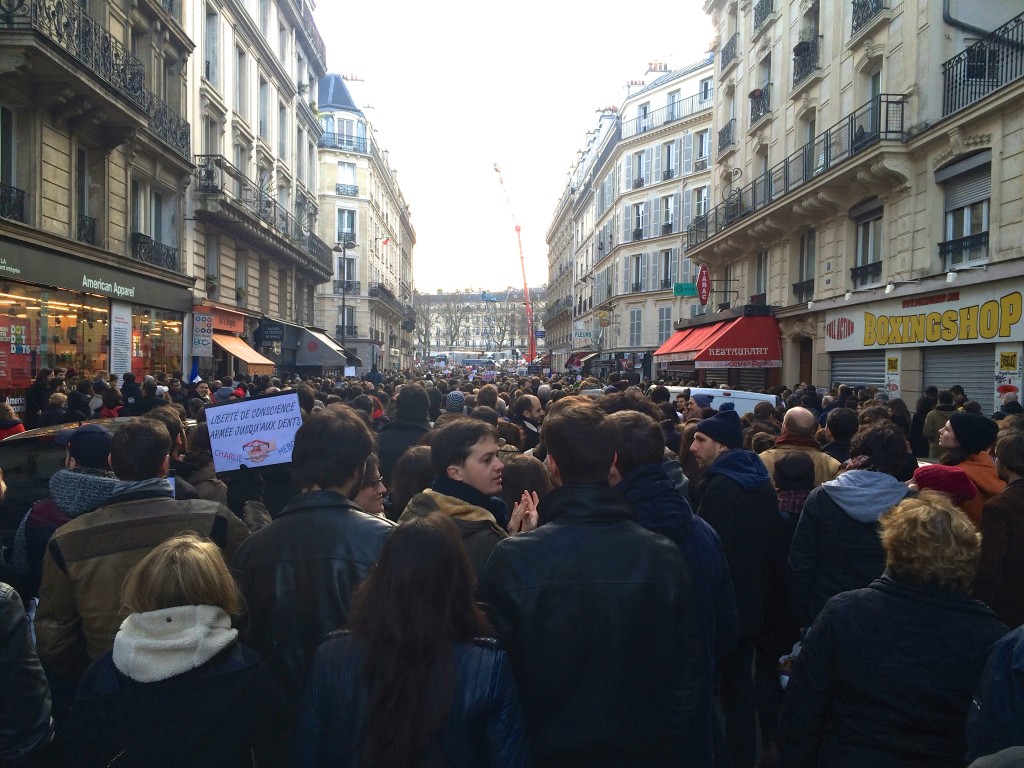
I thought that the mood of the crowd was… peaceful. Considering all the people, crowded up against each other, I thought that it could be tense, but there were people of all shapes and sizes, and families, and what I’d never seen at a protest before: many people had made individual signs: ‘Je suis Charlie’ on an A4 paper and taped it to their clothes. Or had written it in facepaint or marker on their faces. Perhaps a smaller piece of paper jutting from a hat. Most protests I’ve seen gather people together in groups, according to association and work, with larger banners, and while there were a handful of banners, most people marched as individuals. I found it quite charming the number of children who had drawn their own signs. I also found something quite heartwarming in the many expressions of solidarity: I am a police officer, I am Jewish, I am Muslim, I am the woman killed, we are all in this together. There are waves of applause, but I could never see why. Much later, going home, police vans drive through the crowds and are applauded, so I think perhaps the applause may have been for the police. Occasionally someone tries to lead a chant: ‘Charlie!’ Clap clap clap. ‘Charlie!’ Clap clap clap. I find it completely strange that the Charlie they speak of was originally the comic Charlie Brown who I grew up with, a symbol of America, but now changed to represent something French, and in a much different context.
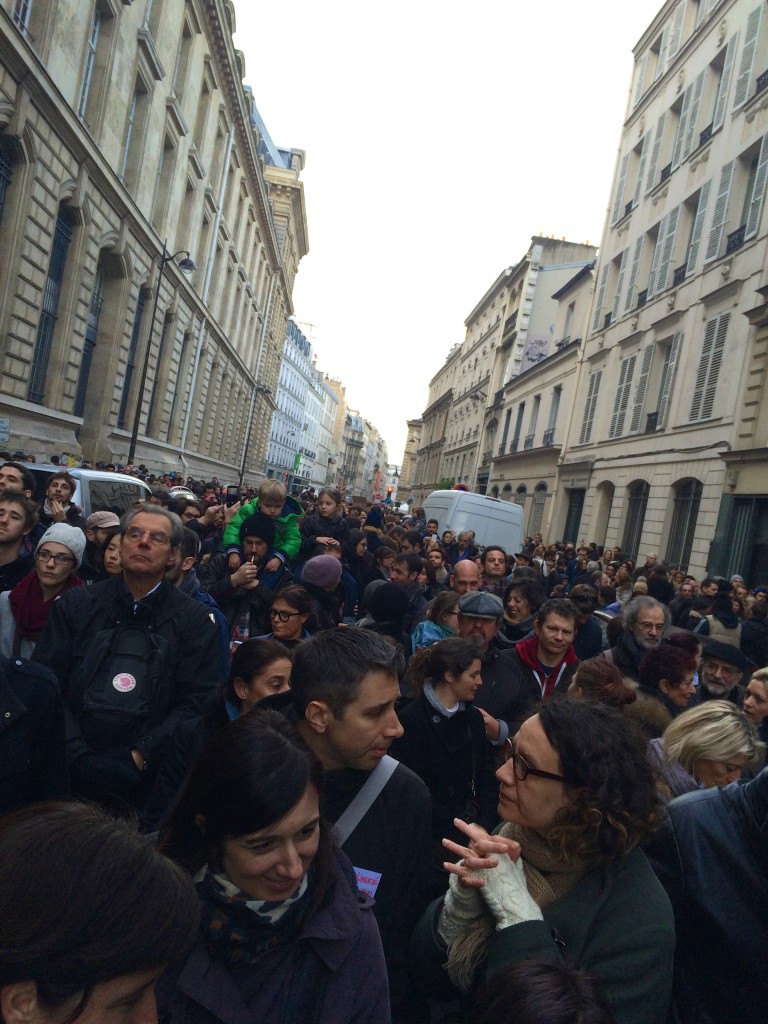
I was glad I was with a Parisian to ask about signs I didn’t understand. He didn’t understand either. ‘Charlie Abdo’ said one sign: Charlie abdominal. Another said, in reference to the French tradition on epiphany of hiding a porcelain toy (or bean) in a pastry called ‘Galette de Roi’, ‘I haven’t got the bean’. What? Brice had no idea either. The truth is that in the middle of the crowds, I never once had a good view of it; all I had was a sense of huge crowds all around. The closest experiences I’ve had to it, funnily enough, are gay pride parades. Except that people had much more clothes on. In fact, I had to comment that while it was a demonstration, they were the nicest dressed demonstrators I’d ever seen. Parisians are extremely well dressed.
A number of friends have asked what the mood of the city is, but really, I can’t tell. I don’t have a lot of contact with people here, I ride by them on my bicycle, I pass by them in the busy street outside our apartment. But how could I tell how they feel? There are many signs in the windows. At UNESCO where I’m working, there are numerous ‘Je suis Charlie’ posters, as well as official statements about UNESCO supporting freedom of the press and freedom of expression.
Tonight, I felt the urge to write something down, as well as put up some of the photos I took at the rally. It’s not all baguettes and fromage here in Paris; and this incident is a jolt of reality, considering most of my blog posts and facebook pictures are of the Eiffel Tower, pastries and meals at restaurants.
Friends also ask whether I was near to the event. Paris is so concentrated, it was a bit of a shock to think how small the location was that everything happened in. The Charlie Hebdo offices are about a 15 minute bicycle ride from our apartment. A day or two later, I went to an event in the 20th arrondisement, which is not so far away from the incident at the Kosher grocery store. I did feel during those days a bit of terror. When it happened, I thought right away to the incident in Martin Place in Sydney, less than a month ago. Two people were killed in that incident, and it brought the city to grief and flowers. Here, so many people more were killed and the killers were still on the loose. What would happen to this city?
I’m not sure really. But I have been following the news closely the whole time, the whole array of comments from around the world, everyone weighing in, pundits and journalists, and Facebook friends forwarding the articles or hashtags that touched them the most. It’s a strange world; it feels unsafe from terrorists in a way, and also unsafe from expressing one’s opinion, a maestrom of debate and tension and opposition. Living in Paris for this period made me feel it was appropriate to say… something. But I thought it easier instead to adjudicate the articles I found most useful.
This was my post to Facebook:
‘Paris is sad and on edge. There is a rally planned for Sunday. Our workplace held a minute of silence at noon yesterday.
I found these commentaries about the Charlie Hebdo killings the most enlightening. I think all of them have a common thread: let’s not jump into judgements, theories and rhetoric but seek to understand, the basis I hope for action.
When the rallies are over, killers are caught and the next tragedy takes over the news cycles, what I’d hope to see are real ways forward, government leadership matched with community expertise and knowledge to find specific national and local solutions, not universal slogans or fear.
Omid Safi hopes the French response will be, ‘a renewed commitment to a robust and pluralistic democracy, one which encompasses marginalized communities’.
The piece by Juan Cole says to me that countering anti-muslim sentiment is the more important gesture than defending free speech which feels both like a no-brainer and also a distraction. Could the terrorists, rather than attacking the right to expression, be trying to create anti-Muslim sentiment to recruit more members? If so, the Australian response to the Martin Place killings, #ridewithme, seems even more amazing.
Lastly, Australian Chad Parkhill’s piece in Junkee questions the hashtag #JeSuisCharlie and asks us to ‘respect the dead by trying to understand where they were coming from, and resisting the urge to make Charlie Hebdo stand for something it never has.’
Food for thought.’
To these I’d add a few more articles (through their coverage, I was reminded what a good newspaper UK’s the Independent is):
Robert Fisk’s commentary taught me about the atrocities in Algeria of the French government. I’ve found myself wanting to say after the incident that this was a result of madmen and lunatics, and I’ve heard others describe it as so. But that puts the reasons for it in the realm of mental health rather than the socio-political. I was familiar with the American involvement in propping up dictatorships such as in Chile, Guatemala and Nicaragua, involving the killings of thousands of innocents but wasn’t familiar with the French equivalent. It’s not an excuse of the killings, but as political commentators point out: we need to look at the political context for what happened, not ‘security problems’.
Patrick Cockburn is one of these voices, and I’m unsettled to read his article, pointing out that in 2001 al-Qaeda had a few hundred activists confined to a few camps and towns in Afghanistan and Iraq, and now after a ‘war on terror’, ‘al-Qaeda-type movements control large areas of Iraq and Syria and dominate the Sunni Arab armed opposition in both countries’ and are linked to terrorist attacks like Paris has just experienced.
The newspapers tell me that somewhere around 2,000 young French citizens have gone to Syria and Iraq to fight with the militants. The issue of ‘security’ and controlling these citizens seems short-sighted. What are the larger causes of discontent? How can people like these be engaged in society, and government start to address socio-economic inequality and disenfranchisement? My years of working in the HIV sector tell me that community-based solutions require working with those affected by an issue or problem. I fear that a march of a million peace-abiding citizens, expressing solidarity and support for freedom of the press, won’t have a long-term benefit. After all, isn’t that what the terrorists wanted? A reaction? While it is a reasonable and honourable sentiment to say that love will conquer hate, I don’t think the suicide bombers and violents Islamists really care.
There is of course the other issue arising just today and yesterday, the massacre of 2000 people in Nigeria by Boko Haram, and how it throws into sharp relief the difference in attention by the world to Western lives compared to others. What’s with that? the Independent writes.
But it’s obvious, of course. We relate to, and grieve, about what we can understand and imagine, and here in Paris where some cartoonists have died, and police officers, and those in a kosher grocery shop, I can picture them, just as I can see the two who died in Sydney last month, and I am sad for their families and loved ones, their cities, and this strange, terrible world we find ourselves in.


